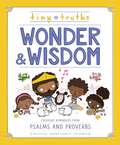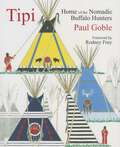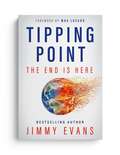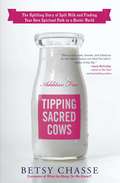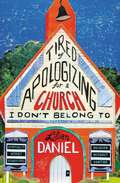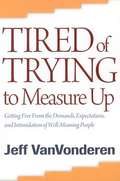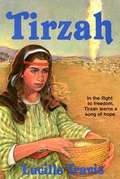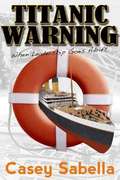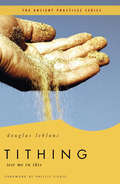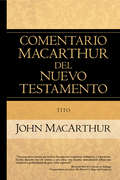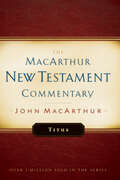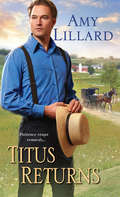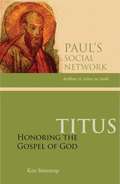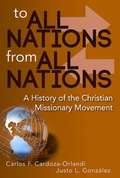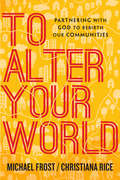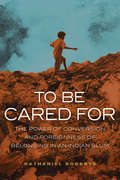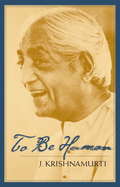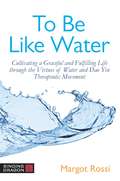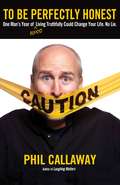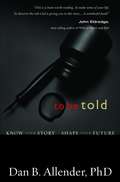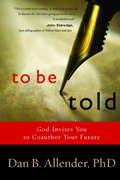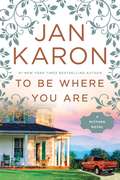- Table View
- List View
Tiny Truths Wonder and Wisdom: Everyday Reminders from Psalms and Proverbs
by Joanna Rivard Tim PennerAn engaging introduction to Psalms and Proverbs, Tiny Truths Wonder and Wisdom is a collection of bite-sized readings that teaches children how to live a life of love and gratitude, make good choices, and ask honest questions.This fun and thoughtful book is full of little lessons about God&’s love for us, as well as lessons about what it means to share his love with everyone by being a good friend, acting as a peacemaker, forgiving our enemies, watching our words…and many, many more! Use this playful book to help your children learn what it looks like to live a life of love, wisdom and wonder–just as God made us to.An ideal companion to The Tiny Truths Illustrated Bible, Tiny Truths Wonder and Wisdom helps children ages 4 to 8 discover:Who God is—the one who made everything and everyoneWho we are—his children, whom he loves unconditionallyWhat we were made for—to love God and everyone elseTiny Truths Wonder and Wisdom also features:Illustrations that celebrate the diversity of our worldApproachable, easy-to-understand text that&’s perfect for shared or independent readingA kid-friendly topical index
Tipi: Home of the Nomadic Buffalo Hunters
by Paul GobleAward-winning author Paul Goble examines the construction, art, and significance of the tipi to the Plains Indians in his newest book, entitled Tipi: Home of the Nomadic Buffalo Hunters. Through a re-telling of the old-timer's stories, Goble shows how the tipi was more than just a home, but an expression of spiritual beliefs.
Tipping Point: The End Is Here
by Jimmy EvansIn this eye-opening book, Jimmy Evans examines biblical prophecies about the end times and points to their unmistakable parallels with today’s world. With clear, insightful analysis of Scripture, he answers many common questions, such as: • Are we living in the end times? • How should Believers respond to increasing immorality? • Will Christians go through the Tribulation? • What role does Israel play in God’s prophetic plan? • Are COVID-19 and other world events announcing the imminent return of Jesus? Ultimately, Tipping Point will help you understand current events with confidence. There is no going back, but hope and peace are possible as God’s plan unfolds and we approach the end of the age.
Tipping Sacred Cows
by Betsy ChasseWife, mother, and award-winning producer of the sleeper hit What the Bleep Do We Know!? Betsy Chasse thought she had it all figured out...until she realized she didn't. She didn't know anything about happiness, love, spirituality, or herself...nothing, nada, zilch. In a book that's anything but quiet, Chasse takes readers on a playful romp through the muddy fields of life and spirituality. Witty, yet unflinching, Chasse exposes her own experience tipping sacred cows and dissects the fragile beliefs we all hold so dear. Because the truth is, we each have a choice to believe the stories we tell ourselves or create new ones. A candid, no-nonsense confession, Chasse's story gives readers the freedom to break free from their old patterns and gleefully frolic through fields, cow tipping at will and in the process, create a new reality for themselves.the rest of us. So throw everything you think you know about spirituality out of your spiritual junk drawer and start over.
Tired of Apologizing for a Church I Don't Belong To: Spirituality without Stereotypes, Religion without Ranting
by Lillian DanielThe popular preacher and public intellectual Lillian Daniel continues to take on the "Spiritual but Not Religious" individuals and shows Christians how to reach them. Sloppy talk about Christianity has become an acceptable prejudice. TIRED OF APOLOGIZING FOR A CHURCH I DON'T BELONG TO provides humorous yet knowledgeable commentary on the way religion is talked about today. Daniel explains Christian ideas and practices in non-academic, yet non-facile terms. In her signature style, she outlines four types of non-church-goers: no-longer, no-way, never-have, not-yet. With experiential insight from over a decade as a pastor, she explains how churches of all denominations and doctrines can provide them enlightened rigor, reasons for belief, and authentic religious community. No one should have to check their brain at the door of the church, she says, and churches must deal with present-day issues and be intellectually open, inviting people to bring questions, rather than dispensing old, easy answers.
Tired of Trying to Measure Up: Getting Free from the Demands, Expectations, and Intimidation of Well-Meaning Christians
by Jeff VanvonderenHelp for those who live by unwritten expectations and rules assumed of a 'perfect Christian,' but who instead feel spiritually drained and perpetually guilty. The answer is to stop striving to be a perfect Christian and start living your life for Jesus Christ.
Tirukkovaiyar (aka Tiruchitrambalakkovaiyar)
by ManikkavachakarAs a staunch devotee of Lord Shiva, Manikkavachakar in 25 chapters containing 400 verses visualize the state of happiness of life in 25 stages and emphasizes that the life attains complete happiness in mixing and mingling with Lord Shiva.
Tirzah
by Lucille TravisFleeing with Moses from captivity in Egypt, twelve-year-old Tirzah learns a song of hope as she tries to survive to reach the promised land.
Titanic Warning
by Casey M. SabellaNear midnight, the heralded and huge White Star liner Titanic, her invincibility never before in question, is a tiny speck on a vast ocean. Four days out on a much-anticipated maiden voyage, the luxury vessel has been fatally grazed by an iceberg. Labeled unsinkable by an adoring public, Titanic will plunge beneath the cold waters of the North Atlantic in under three hours. In Titanic Warning, author Casey Sabella blends a vivid re-telling of the disaster with commentary on the state of the modern-day Church and the lack of commitment to discipling the masses. How did three ships in the vicinity, called upon to rescue the 2500 stranded souls, reflect real personalities in the modern age? Are we prideful like the Titanic? Are we indifferent to the cries of humanity, like the Californian, or do we launch a rescue like the Carpathia? Does the burden to help urge us to escape from it all, like the Samson? The questions are personal, the answers, crucial. Will we heed the warning to put salvation before gleaming monuments? May God help us board the right ship! STUDY AND DISCUSSION QUESTIONS AT THE END OF EACH CHAPTER.
Tithing
by Douglas LeblancStories of people who live a generous and happy life (and why you'll want to live that way too).Journalist Douglas LeBlanc travels the nation to talk with believers whose lives have been enriched by the ancient spiritual discipline of tithing. He discovers people along the way who do not understand the practice as an onerous law but as God's call to a life of generosity and compassion. The effect on their lives is dramatic. LeBlanc talks with a variety of believers--from a pastor in the south side of Chicago to progressive Episcopalians, from an Orthodox rabbi to an Eastern Orthodox priest and his wife. By holding their gifts with open hands, they are drawn deeper into a life of joy and sharing that begins in the very heart of God.Volume VII in Thomas Nelson's Ancient Practices series.
Tito
by John MacarthurUno de los mejores comentarios del Nuevo Testamento disponibles en español, escrito por uno de los grandes pastores de nuestro tiempo. Un excelente recurso para la preparación de sermones, el estudio personal y la vida devocional. [One of the best commentaries of the New Testament available now in Spanish. Ideal for personal or group study and teaching, these commentaries help you better understand and apply scripture.]
Titus MacArthur New Testament Commentary (MacArthur New Testament Commentary Series)
by John MacArthurThese commentaries, part of a set from noted Bible scholar John MacArthur, take readers on a journey through biblical texts to discover what lies beneath the surface, focusing on meaning and context, and then reflecting on the explored passage or concept. With probing questions that guide the reader toward application, as well as ample space for journaling, The MacArthur New Testament Commentaries are invaluable tools for Bible students of all ages. They claim to know God, but by their actions they deny him. - Titus 1:16 Somewhere along the line we've lost the true meaning of being a Christian. These days, it seems that everyone who is not a follower of some other major world religion is considered a Christian. The United States is considered a Christian country, yet its declining morals, its tolerance of sin, and its growing disdain for any association with the Bible proves otherwise.In the third of the pastoral epistles, Paul reminds Titus that faith and actions go hand in hand. He emphasizes the importance of worthy conduct and instructs the church to teach sound Christian doctrine in the face of prevailing heresy.Join John MacArthur as he studies God's Word in order to understand and apply the instructions given in book of Titus.
Titus MacArthur New Testament Commentary (MacArthur New Testament Commentary Series)
by John MacArthurThese commentaries, part of a set from noted Bible scholar John MacArthur, take readers on a journey through biblical texts to discover what lies beneath the surface, focusing on meaning and context, and then reflecting on the explored passage or concept. With probing questions that guide the reader toward application, as well as ample space for journaling, The MacArthur New Testament Commentaries are invaluable tools for Bible students of all ages. They claim to know God, but by their actions they deny him. - Titus 1:16 Somewhere along the line we've lost the true meaning of being a Christian. These days, it seems that everyone who is not a follower of some other major world religion is considered a Christian. The United States is considered a Christian country, yet its declining morals, its tolerance of sin, and its growing disdain for any association with the Bible proves otherwise.In the third of the pastoral epistles, Paul reminds Titus that faith and actions go hand in hand. He emphasizes the importance of worthy conduct and instructs the church to teach sound Christian doctrine in the face of prevailing heresy.Join John MacArthur as he studies God's Word in order to understand and apply the instructions given in book of Titus.
Titus Returns (A Wells Landing Romance #5)
by Amy LillardIn Wells Landing, Oklahoma's warm and welcoming Amish community, there's always hope for a new beginning--and a second chance... Five tumultuous years have changed Titus Lambert in every way. Back then, Titus was preparing to marry his longtime sweetheart, Mandy Yoder. Then came the unthinkable--a tragic car wreck that left Titus serving time for vehicular manslaughter. Titus isn't sure he belongs in this peaceful place anymore, but he must make amends. When he goes to visit the Kings, whose son, Alvin, died that terrible night, he's shocked to see that their farm has fallen into disrepair. Alvin's sister, Abbie, resents Titus's reappearance, but there's no denying she needs his help. Honest toil--and their evolving friendship--slowly help his soul to heal. But with his feelings for Mandy still strong, Titus must choose between two very different futures, and find the strength and faith to claim the surprising gift of a fresh start. Praise for Amy Lillard"An inspirational story of romance, faith, and trust...will appeal to fans of Wanda Brunstetter and Beverly Lewis." --Library Journal on Caroline's Secret "Amy Lillard writes her Amish stories with the respect they are due." --RT Book Reviews
Titus: Brothers And Sisters In Faith)
by Ken StenstrupHuman beings are embedded in a set of social relations. A social network is one way of conceiving that set of relations in terms of a number of persons connected to one another by varying degrees of relatedness. In the early Jesus group documents featuring Paul and coworkers, it takes little effort to envision the apostle's collection of friends and friends of friends that is the Pauline network. The persons who constituted that network are the focus of this set of books. For Christians of the Western tradition, these persons are significant ancestors in faith. While each of them is worth knowing by themselves, it is largely because of their standing within that web of social relations woven about and around Paul that they are of lasting interest. Through this series we hope to come to know those persons in ways befitting their first-century Mediterranean culture. Paul's network is a complex collection of people, many of whom receive only the slightest acknowledgment in the New Testament. While Titus receives more than a cursory mention, the writings that include him come from different generations of Jesus followers. In "Titus: Honoring the Gospel of God, " Ken Stenstrup makes the distinction between these generations of writings and, by employing social-scientific methods, uses Titus to shed light on Paul as a change agent and leader. As one of Paul's coworkers, Titus provided stability and guidance to early Jesus groups. He was welcomed by these groups and reported their hospitality to Paul. Stenstrup emphasizes the collectivistic culture of the first century and explains how this influenced the relationships between Paul, Titus, and the early Jesus groups. "Ken Stenstrup teaches a variety of introductory level Scripture courses at Saint Mary's University of Minnesota. For several years he has been a member of the Social Sciences and New Testament Interpretation task force of the Catholic Biblical Association. "
To All Generations
by Clara Bernice MillerA story of the Amish and Mennonite communities in a southeastern Iowa town through the eyes of one of its oldtimers, 88-year-old Daniel Brenneman.
To All Nations From All Nations: A History of the Christian Missionary Movement
by Justo L. Gonzalez Carlos F. Cardoza-OrlandiSharing the Good News might be understood as the prime directive of the Church from its earliest times, but the Church soon discovered unforeseen obstacles and its own set of temptations, including its lust for power and domination. Although the gospel might be joyfully offered, it was not always received in the same spirit. And the Church was not always gracious with dissent and criticism. Even so, the Church continues to reach out to the least, the last, and the lost—attempting to bring them into the family of God. But for mission to be effective today, it must take advantage of indigenous resources and recognize its limitations as well as its gifts.This book broadly introduces prominent missionary practices and major historical figures using three perspectives. First, it takes into account the missionary activity proceeding from the margins rather than only discussing the center of theological and ecclesial activity. Second, it narrates the cross-cultural, cross-confessional, and cross-religious dynamics that characterize Christian missionary activity. And third, it emphasizes that much missionary activity is generated by national rather than international missionaries. The text concludes with a chapter on the postmodern and postcolonial world.
To Alter Your World: Partnering with God to Rebirth Our Communities
by Michael Frost Christiana Rice15th Annual Outreach Magazine Resource of the Year - Also Recommended in ChurchTo Alter Your World
To Be Cared For: The Power of Conversion and Foreignness of Belonging in an Indian Slum
by Nathaniel RobertsTo Be Cared For offers a unique view into the conceptual and moral world of slum-bound Dalits ("untouchables") in the South Indian city of Chennai. Focusing on the decision by many women to embrace locally specific forms of Pentecostal Christianity, Nathaniel Roberts challenges dominant anthropological understandings of religion as a matter of culture and identity, as well as Indian nationalist narratives of Christianity as a "foreign" ideology that disrupts local communities. Far from being a divisive force, conversion integrates the slum community--Christians and Hindus alike--by addressing hidden moral fault lines that subtly pit residents against one another in a national context that renders Dalits outsiders in their own land."
To Be Human
by Jiddu KrishnamurtiTo Be Human presents Krishnamurti's radical vision of life in a new way. At the heart of this extraordinary collection are passages from the great teacher's talks that amplify and clarify the nature of truth and those obstacles that often prevent us from seeing it. Most of these core teachings have not been available in print until now. Besides presenting the core of Krishnamurti's message, the book alerts the reader to his innovative use of language, the ways in which he would use "old words with new interpretations," then gives practical examples, showing that we can clarify our understanding of life itself--and act on this new understanding. The splendid introduction by David Skitt discusses Krishnamurti's philosophy as a guide to knowledge and experience, the roles knowledge and experience should play in our lives, and the times when it is best to cast them aside and "look and act anew." The book's source notes will aid the inquisitive reader who wishes a deeper understanding of this great teacher's message.
To Be Like Water: Cultivating a Graceful and Fulfilling Life through the Virtues of Water and Dao Yin Therapeutic Movement
by Margot RossiDrawing on South and East Asian philosophies and medicines, this book illustrates how our bodies and minds are influenced by our actions, habits, aging, trauma and thought patterns. Using the analogy of being like water, Margot Rossi presents a range of practices - including imagery, Daoyin therapeutic movement, yoga and mindful attention - that help build awareness and potentially shift our form, physiologically and neurologically.The first section of the book is dedicated to exploring the virtues of being like water, based on 30 years of Rossi's professional and personal experience. Each essay ends with Daoyin therapeutic movements, learned and interpreted from the oral teachings of 88th-generation Daoist master Jeffrey Yuen. The second section offers teachings of Classical Chinese Medicine theory for patients and practitioners alike. It includes detailed case studies, basic diagnostic steps and demonstrates how health concerns can be used as a foundation for change and growth.
To Be Perfectly Honest: One Man's Year of Almost Living Truthfully Could Change Your Life. No Lie.
by Phil CallawayWould I Lie to You? Not This Year. Veteran author and speaker Phil Callaway is no stranger to daunting challenges. He has been laughed at--repeatedly--by large crowds of people from Halifax to Hong Kong. He fathered three children in three years, spent much of last year on airplanes built by the lowest bidder, and flipped an out-of-control ATV, which doesn't mean he sold it for a profit. So who better than Phil Callaway to boldly accept a challenge that would make the average person run and hide? Phil promised to tell the truth for an entire year, and he wasn't joking. Twelve months later, his journal was crammed with successes, near-successes, and outright failures. During his year-long experiment with veracity, he made a disastrous financial investment, fielded hundreds of intrusive questions from friends and strangers, attended a thirty-year class reunion, and waded into possibly the most revealing--and hilarious--situations he has ever documented. Find out what happens when a follower of Jesus does his level best to always tell the truth. There is no doubt you'll be entertained. But don't be surprised if you are left with a question: how might your life be changed if you sold out to the truth--with no exceptions?From the Trade Paperback edition.
To Be Told: God Invites You to Coauthor Your Future
by Dan B. AllenderIf I asked you to tell me your story, what would you say? Would you mention the pressures you're facing at work? Would you talk about where you went to college? Would you tell me it's none of my business? Everyone has a story. Put another way, everyone's life is a story. But most people don't know how to read their life in a way that reveals their story. They miss the deeper meaning in their life, and they have little sense of how God has written their story to reveal himself and his own story. Let's engage the Author of our story so we can enter into the joy he holds before us if we live out our story for the sake of others. If we come to know our story and then give it away, we will discover the deepest meaning in our lives. We will discover the Author who is embedded in our story, and we will know the glory he has designed for each one of us to reveal. It is toward this good end that we now set out.
To Be Told: Know Your Story, Shape Your Future
by Dan B. AllenderGod Invites You to Coauthor Your Future. It Starts with Reading Your Past. In this companion workbook to Dr. Dan Allender's groundbreaking book "To Be Told," you will find practical, easy-to-follow exercises to help you explore and embrace the stories of your life. The exercises inside will equip you to: -recall past experiences and find the meaning God has written there-understand how individual events fit into the bigger themes of your life-write down your stories in a way that reflects God's authorship of your life-identify the passions that drive you, and see how God uses them to guide you into the future -tell your story in a way that brings glory to God and reveals him to others Learn how to read and study your story, and then start telling it to others. God invites you to co-author with him the rest of your life's story-a story that opens up your future and glorifies God.
To Be Where You Are (A Mitford Novel #14)
by Jan KaronA NEW YORK TIMES BESTSELLER#1 New York Times-bestselling author Jan Karon returns with the fourteenth novel in the beloved Mitford series, featuring three generations of Kavanaghs.Wounds heal, bonds grow stronger, and celebrations continue...Welcome back to beloved Mitford. After twelve years of wrestling with the conflicts of retirement, Father Tim Kavanagh realizes he doesn't need a steady job to prove himself. Then he's given one. As for what it proves, heaven only knows.Millions of Karon fans will be thrilled that it's life as usual in the wildly popular Mitford series: A beloved town character lands a front-page obituary, but who was it, exactly, who died? And what about the former mayor, born the year Lindbergh landed in Paris, who's still running for office? All this, of course, is but a feather on the wind compared to Muse editor J.C. Hogan's desperate attempts to find a cure for his marital woes. Will it be high-def TV or his pork-chop marinade? In fiction, as in real life, there are no guarantees. Twenty minutes from Mitford at Meadowgate Farm, newlyweds Dooley and Lace Kavanagh face a crisis that devastates their bank account and impacts their family vet practice. But there is still a lot to celebrate, as their adopted son, Jack, looks forward to the most important day of his life--with great cooking, country music, and lots of people who love him. Happily, it will also be a day when the terrible wound in Dooley's biological family begins to heal because of a game--let's just call it a miracle--that breaks all the rules.In To Be Where You Are, Jan Karon weaves together the richly comic and compelling lives of two Kavanagh families, and a cast of characters that readers around the world now love like kin.
